Help Scott get this job
If you've got a minute, follow the link below and give my friend Scott's video application a rating of 5.
He's applying for a caretaker/PR position in Australia. I think he'd be great at it.
Hell is Terrorism
Last fall my family and I were taking a walk around town when we saw this church sign:
Emma read the sign and we discussed it as we walked. Sara quickly noted a grammatical problem with the sign, but I will leave that aside for now and focus on the meaning and the goal of the sign. There may be other possible meanings, but I think that this sign was put up to send the message that people who "live like there is no God" will be tortured in hell for eternity unless it turns out that they are right and God does not exist. The sign belongs to a church in the Southern Baptist Convention, which broke away from the rest of the Baptist Church in 1845 so that SBC members could continue to own slaves. Someone in the church decided that the doctrine of hell should be used to threaten the public but hell should not be mentioned by name on a public sign.
First of all, if someone is convinced that God does not exist and the Bible is not true, then they almost certainly don't believe that hell exists. So, even if threats of torture were a good way to bring people into your church, the sign would still be ineffective because it threatens the reader with a nonexistent punishment.
 Hell is a bad way to make and keep converts because it relies on fear. There is a name for the tactic of using irrational fear to change a person's beliefs or actions: terrorism. When a religion uses hell (or any other threat) to scare a person into line, they're using the same tactics as Al Qaeda, Ted Kaczynski, Timothy McVeigh, Hezbollah and the Ku Klux Klan. Just to make myself clear:
Hell is a bad way to make and keep converts because it relies on fear. There is a name for the tactic of using irrational fear to change a person's beliefs or actions: terrorism. When a religion uses hell (or any other threat) to scare a person into line, they're using the same tactics as Al Qaeda, Ted Kaczynski, Timothy McVeigh, Hezbollah and the Ku Klux Klan. Just to make myself clear:
Hell is terrorism
Terrorism is an act of desperation. It is used when a group is unable to convince others based on the quality of their ideas. Remember that when you see or hear the threat of hell from a religious group. I'm happy to report that my 7-year-old daughter is already very skeptical of the doctrine of hell. I hope that she'll be immune to this kind of fear mongering if anyone ever tries to use it on her.
Those who believe in the Christian hell rarely lose any sleep worrying that they've chosen the wrong religion and they'll end up in Jahannam, Naraka, Tartarus, Xibalba or the hell of any other religion. Even (or maybe especially) those who preach hell know that it's easy and useful for a religion to invent stories about hell, but impossible to prove or disprove them.
There are plenty of Christians and churches who have left behind sadistic doctrine of hell and the tactic of terrorism in general. Of course, the easiest way to rid yourself of the fear of hell is to realize that the Bible is a collection of stories composed by humans to further a religion. It makes perfect sense that those ancient yarn-spinners would cook up the idea of hell. "Do what we say or the invisible man in the sky will make you go down to where it's hot and you're eaten by worms forever!" When their promises of pre-death punishment or blessing were shown to be empty, they shifted to promises about what happens after you die. We know better than to be moved by spooky stories like that today, right?
Church and State Reprised
Several of my Facebook friends have been joining the cause Keep God in Schools. Back when I was a pastor, I wrote an article for the church newsletter about the separation of church and state. My view today is very similar to my view then. Separation of church and state is good for the church and good for the state. I would love to discuss this with anyone who disagrees. My first question: Which denomination's understanding of God should be taught in our schools?
A Film About Homosexuality and Christianity
 Is it possible to be a devoted Christian and an openly gay person? How do Christian families deal with the news that their child is gay when their church tells them that homosexuality is an abomination? These are some of the questions tackled in the documentary For The Bible Tells Me So. This award-winning film tells the stories of several families and how they were able to make peace between their religious beliefs and their love for their children. There are also interviews with religious scholars on both sides of the issue. Many scholars believe that the Bible, when interpreted correctly, does not condemn homosexual relationships.
Is it possible to be a devoted Christian and an openly gay person? How do Christian families deal with the news that their child is gay when their church tells them that homosexuality is an abomination? These are some of the questions tackled in the documentary For The Bible Tells Me So. This award-winning film tells the stories of several families and how they were able to make peace between their religious beliefs and their love for their children. There are also interviews with religious scholars on both sides of the issue. Many scholars believe that the Bible, when interpreted correctly, does not condemn homosexual relationships.
The film is heartwarming and instructive. Although you hear from some Christian leaders who maintain that homosexuality is wrong and some that don't, in the end it's clear that the filmmaker sides with those who are more accepting. He shows the healing that comes to families who love and accept their gay children unconditionally. He also shows one family that was torn apart permanently because this religious belief came between a mother and a daughter.
Here's a trailer for the movie:
[youtube]HpJAucyX7RE[/youtube]
Here's a clip showing a little cartoon from the movie about whether homosexuality is a choice:
[youtube]BKExZKfgx9s[/youtube]
Millions of Christians and thousands of churches already welcome gay members. In my neck of the woods, churches are not so forward thinking. Many still believe that gay people must try to change their orientation by prayer and sheer force of will or that they must be celibate for the rest of their lives. I hope people watch this film and learn that there is a better way.
An update to my religious autobiography
I recently ran across a book that played a significant role in one phase of my life, so I've updated my religious autobiography by adding this paragraph:
Over the next few years I had many discussions with family and friends about my shift in beliefs. For some of them, my decision to go to a church that worshiped with instruments was almost as bad as abandoning God altogether. (This fact would prepare me and them for the bigger shift that I would go through a few years later.) One of the books that helped me cope with this situation was Free In Christ by Cecil Hook. The book is available for free online or you can order a print copy. Hook never left the coC, but he spoke persuasively against the legalism and division that is so prevalent in many churches of Christ. I recommend the book to anyone in the church who wants to see things from another prospective and anyone outside the church who wants to see what makes this little non-denominational denomination tick.
Twain on Irreverence
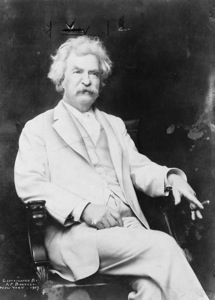
"Irreverence is another person's disrespect to your god; there isn't any word that tells what your disrespect to his god is."
-- Mark Twain
Book Review: 50 Reasons People Give for Believing in a God
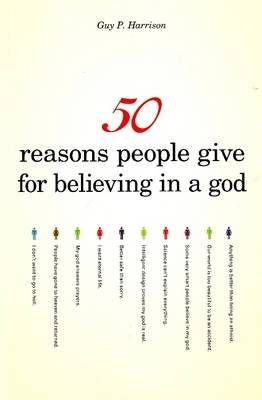 I've read several books about atheism, but my most enthusiastic recommendation to date goes to Guy Harrison's 50 Reasons People Give for Believing in a God. This book doesn't narrate the author's loss of faith like Dan Barker's books, nor is it a provocative and artful attack against Christian belief like The God Delusion by Richard Dawkins, nor yet is it a scientific examination of religion as a natural phenomenon like Dan Dennett's Breaking the Spell. I recommend this book to believers and nonbelievers alike because it is a straightforward and respectful evaluation of the reasons that normal people (not theologians) give for believing in a god.
I've read several books about atheism, but my most enthusiastic recommendation to date goes to Guy Harrison's 50 Reasons People Give for Believing in a God. This book doesn't narrate the author's loss of faith like Dan Barker's books, nor is it a provocative and artful attack against Christian belief like The God Delusion by Richard Dawkins, nor yet is it a scientific examination of religion as a natural phenomenon like Dan Dennett's Breaking the Spell. I recommend this book to believers and nonbelievers alike because it is a straightforward and respectful evaluation of the reasons that normal people (not theologians) give for believing in a god.
The book is organized into 50 stand-alone chapters that average about 7 pages each. I read the book cover to cover, but you could skip around to the chapters that interest you the most. If you believe in your god because he answers prayers, then jump right to chapter 14 and read the author's response to that reason. This organization makes the book very approachable.
One of the things that sets this book apart is that it does not focus on Christian belief exclusively. Very often, the debate is between belief in Yahweh and belief in no god at all. That makes the Christian's task seem easier than it really is. Harrison points out that the Christian God is only one of thousands of gods and goddesses. Throughout the book he spells "god" with a lowercase g and gives examples from several world religions. He doesn't attack any one religion, but shows that they make similar claims for many of the same reasons and all share a lack of evidence. The assertion that Yahweh has impacted a person's life loses most of its force when we're reminded that people say that their lives are impacted in the same ways by Allah, Ganesha, Isis and ancestral spirits.
The best thing about this book is its tone. Harrison is uncompromising in his skepticism, but he never stoops to mockery. He acknowledges the benefits of faith and religious community. He shares experiences of being moved by music and rituals from various traditions. He pays respect to the important role that religion has played in the history, culture and personal lives of believers. He simply points out that there's no evidence that any of these gods exist and there are often simpler explanations. Believers can read this book without being belittled or offended.
But why would a believer want to read what an atheist has to say about faith? I think it's good to understand both sides of important issues. That's why I've read several books by Christians since I've become an atheist. Perhaps I'll learn something I didn't know and reconvert. Or perhaps I'll better understand why people believe and that will help me to appreciate them (and debate with them). Believers should understand nonbelievers for the same reasons. It will help you understand that we have reasons for not believing. It will help you examine the roots of your own belief, which may strengthen your faith. You'll be more equipped for debating with atheists, too.
You can buy the book from Amazon here or do like I did and check it out from the library. Guy Harrison was interviewed about the book on the Point of Inquiry podcast.
Sara speaks
There have been over 600 comments on Sara's 4.5 year old Worst Worship Songs post. For the first time in a while, she responded to the commenters.
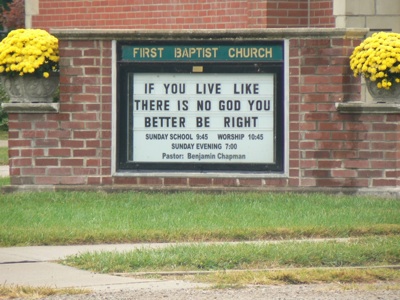
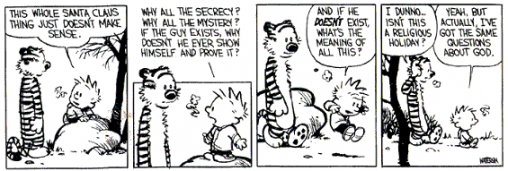
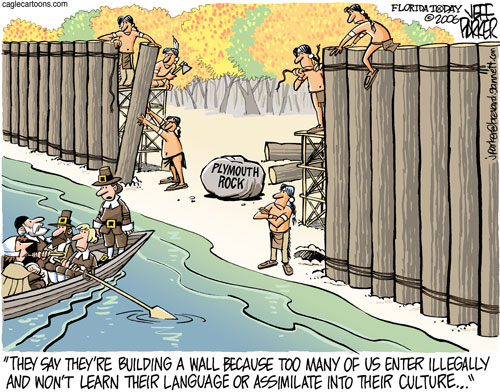

Recent comments